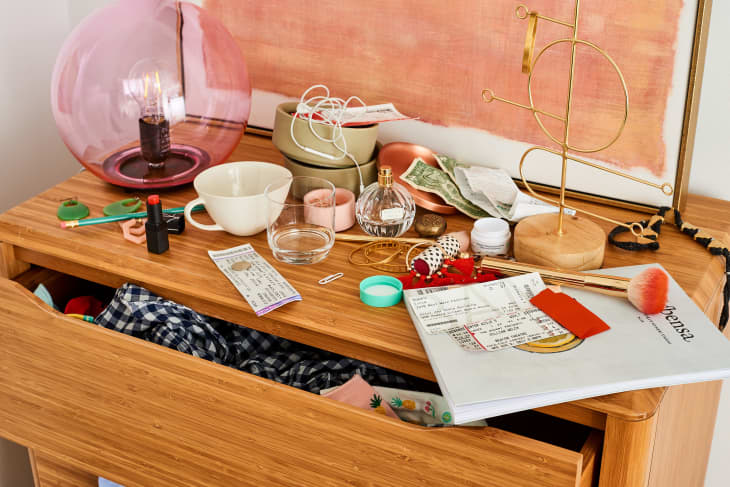5 Habits to Steal from Organized People

Here’s the truth: When it comes to everyday messes, organized people don’t necessarily have better habits, they just have different inner dialogue. For example, I’m the type of person who, behind the closed doors of closets, accumulates piles of papers and boxes without shame. Eventually, I reach a point where I can’t tolerate those piles (usually, when I need more space for something else). But I know, in the interim, my mess doesn’t indict me as a person. Those occasionally disorganized spots are just part of living, and I’ll get to them when I have time and energy.
My constant cluttered-to-organized pipeline situation got me thinking: Maybe organization isn’t just about how your space looks at any given moment, but more about your bigger perspective? Maybe being an “organized person” isn’t about buying all the right products, but rather developing a calmer, more compassionate inner dialogue about messes? To learn more about how to shift my mindset, I spoke to a few pro organizers who help their clients spark new ideas about organized lives all the time. Here are five mindset shifts that can help you get there, too.
Organized People are Strategic
- Instead of: “My entryway is covered in boxes, why am I such a mess?”
- Try: “There are boxes all over the entryway — I’ll make a plan to handle that this weekend.”
Even the neatest, most organized people order from Amazon and buy 12-packs of LaCroix, so the occasional collection of boxes isn’t a sign that you’re clutter-y beyond repair. The difference is, organized people don’t get overwhelmed by (or disparage themselves about) the same mess. Instead, they survey their surroundings, take a deep breath then make a timely, actionable plan to tackle the problem.
Organized People Embrace Real Life, Not Perfection
- Instead of: “No matter how hard I try, I just can’t keep my house looking good like all the influencers I follow on social media.”
- Try: “My house is a place people live in and enjoy. When the time comes to reset the house for the week, it shouldn’t take me more than an hour to do so.”
For one thing, what so-and-so posts to their highlight reel may not be a true picture of how they actually live on a daily basis — and your end-of-the-weekend mess isn’t the full story, either. According to DiTer Avest, owner of D is Organized in Baltimore, organized people are as realistic as they are on the ball. They know homes are dynamic, not static, and they come up with game plans for resetting their spaces when things cross a particular line.
Organized People Create Routines
- Instead of: “I just don’t have time or energy to keep everything in its place.”
- Try: “Time seems to be getting away from me — I’ll create routines to ensure I have time to care for my house and myself.”
Let’s be honest: Keeping stuff organized takes work. And if you’re already busy or overwhelmed, you might think you don’t have time to get that work done. Organized people don’t see it that way, says Avest. Instead, they recognize that a well-organized space is a key to enjoying and resting in their homes, so they’re willing to cut out the calendar clutter that keeps them from achieving that state of calm in their spaces.
Organized People Ask for Help
- Instead of: “My kitchen looks like a tornado passed through it; I guess I won’t be having people over anytime soon”
- Try: “I’ll either clean the house or hire someone to help me so I can spend meaningful time with the people I love.”
Whether your house is full of actual dirt or it’s just covered in clutter, it can feel overwhelming (and embarrassing) to invite other people into a space that feels disheveled. Rather than fixating on the past and present messes in front of them, organized people see the potential of what their spaces could be — and Avest says they’re not too proud to ask for help, especially if that means they can live more fully and meaningfully in their homes.
Organized People Prioritize Their Well-being
- Instead of: “I’m so busy and disorganized that my well-being is in jeopardy”
- Try: “This weekend I’ll clean out the pantry for food that makes me feel good or clear out a space in the basement for moving my body.”
The state of your space isn’t just about aesthetics or hospitality. If your home is in disarray, you won’t be as inclined to make positive choices that encourage your mental and physical well-being. While “messy” people might check out or see themselves as victims, Avest says “organized” people take ownership over how their spaces impacts their lives — then come up with plans to improve it.